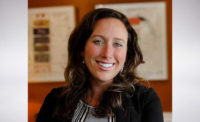Name/Title/Company: Cecilia Davis, senior electrical designer, McClure Engineering
Age: 36
Educational Experience: Bachelor’s degree in architectural technology
What does your day-to-day job entail?
My day-to-day job entails collaborating with fellow engineers, architects, and designers to create coordinated and well-designed building systems. Most of my design work is completed via 3D modeling inRevit.
What caused you to/when did you fall in love with engineering?
I’ve always been a very technical person and a lover of mathematics. It was during my architectural studies that I found engineering to be a track more appealing and suitable for my personality. This was solidified when I landed an engineering internship during my junioryear.
What has been the most rewarding/proudest aspect of your engineering career?
The most rewarding aspect of my career is that I’m able to see my finished work, and people who I know tend to frequent and/or work at facilities that I had a hand indesigning.
What challenges do women face in this profession? Can you give a personal example? Why aren’t there more women in engineering? How can we increase the number of women in engineering?
Occasionally, I will still have men ignore and/or look directly past me in conversation to get the opinion of my male counterpart. I will never forgot when I was at a job site with a female engineer and a contractor asked, “Are you two the interior designers?” She politely let him know exactly who we were. I believe there’s currently a shortage of women because of how the profession is marketed and because it takes time to see the residual effects of breaking into any industry. We can increase the number by getting students interested earlier, maybe late grade school to early middle school years.
How many years have you been active in the engineering sector? What’s changed the most in that time? What’s changed the least?
I’ve been in engineering for more than 12 years. Over the years, I’ve seen more women hired at the firms I’ve worked for and assume leadership positions. I’ve also noticed that more firms are transitioning to 3D modeling. What I’ve seen change the least is the ongoing challenges to close the gap between electrical and mechanical groups.
As an electrical engineering leader, what concept or philosophy is the hardest to teach or for students to learn?
I find the 3D software is the hardest to teach. Once someone is able to be fluent in that, we can teach them anything from a design perspective.
Of all your projects, which would you deem your favorite? Why so?
My favorite project thus far is one is one that I’m currently working on, The Zoo Wildcare Safari. The zoo is a major attraction in my area, and it’s somewhere I frequented as a child and have taken my daughter to.
What drives/motivates you every day?
What motivates me every day is the amazing people I get to work with at my company and seeing my work upon completion.
What remains on your engineering bucket list — what do you aspire to do that you haven’t accomplished yet?
I’ve always wanted to design for a hotel resort in a tropical area. This would provide the perfect excuse for a getaway!
What’s one thing no one knows about you?
“Grease 2” is my guilty pleasure, and I tend to sing and dance along every time I watch it.
List any mentors who’ve helped you succeed and describe precisely how they’ve shaped your success.
One of my greatest mentors is Michael McAdon. He laid the foundation for what it is I do today. I came from an architectural background with knowledge of how to use the programs. He patiently worked with me and helped me to learn the trade.
What advice do you have for prospective female engineers considering entering the field?
I would advise women to not focus on barriers of the past. Be the best you can be at your profession and let your work speak for you.





